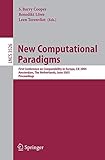New Computational Paradigms [electronic resource] : First Conference on Computability in Europe, CiE 2005, Amsterdam, The Netherlands, June 8-12, 2005, Proceedings / edited by Barry S. Cooper, Benedikt Löwe.
Contributor(s): Cooper, Barry S [editor.] | Löwe, Benedikt [editor.]
| Löwe, Benedikt [editor.] | SpringerLink (Online service)
| SpringerLink (Online service) .
.
Material type:  BookSeries: Theoretical Computer Science and General Issues: 3526Publisher: Berlin, Heidelberg : Springer Berlin Heidelberg : Imprint: Springer, 2005Edition: 1st ed. 2005.Description: XVIII, 578 p. online resource.Content type: text Media type: computer Carrier type: online resourceISBN: 9783540322665.Subject(s): Computer science
BookSeries: Theoretical Computer Science and General Issues: 3526Publisher: Berlin, Heidelberg : Springer Berlin Heidelberg : Imprint: Springer, 2005Edition: 1st ed. 2005.Description: XVIII, 578 p. online resource.Content type: text Media type: computer Carrier type: online resourceISBN: 9783540322665.Subject(s): Computer scienceIntroduction: If CiE Did Not Exist, It Would Be Necessary to Invent It -- Computably Enumerable Sets in the Solovay and the Strong Weak Truth Table Degrees -- The Fan Theorem and Uniform Continuity -- Continuous Semantics for Strong Normalization -- A Thread Algebra with Multi-level Strategic Interleaving -- Membrane Computing - Current Results and Future Problems -- How to Compare the Power of Computational Models -- Recombinant DNA ,Gene Splicing as Generative Devices of Formal Languages -- Quantum Computing -- Symbol Grounding in Connectionist and Adaptive Agent Models -- The Complexity of Inductive Definability -- A Logical Approach to Abstract Algebra -- Schnorr Dimension -- Abstract Geometrical Computation: Turing-Computing Ability and Undecidability -- Computability in Computational Geometry -- Shrad: A Language for Sequential Real Number Computation -- Borel Ranks and Wadge Degrees of Context Free ?-Languages -- Fewer Epistemological Challenges for Connectionism -- An Algebraic View on Exact Learning from Queries -- The Church-Turing Thesis: Breaking the Myth -- Robust Simulations of Turing Machines with Analytic Maps and Flows -- Infinitary Computability with Infinite Time Turing Machines -- Combinatorial Models of Gene Assembly -- Symmetric Enumeration Reducibility -- Computability-Theoretic and Proof-Theoretic Aspects of Vaughtian Model Theory -- Finite Trees as Ordinals -- On the Problems of Definability in the Enumeration Degrees -- Computing a Model of Set Theory -- Proof Mining in Functional Analysis -- Towards Computability of Higher Type Continuous Data -- The Power of Mobility: Four Membranes Suffice -- The Small Grzegorczyk Classes and the Typed ?-Calculus -- The Flow of Data and the Complexity of Algorithms -- On a Question of Sacks - A Partial Solution on the Positive Side.-The Low Splitting Theorem in the Difference Hierarchy -- Geometric Software: Robustness Issues and Model of Computation -- The Dimension of a Point: Computability Meets Fractal Geometry -- Accepting Networks of Splicing Processors -- Hilbert's Tenth Problem and Paradigms of Computation -- On Some Relations Between Approximation Problems and PCPs over the Real Numbers -- Correlation Dimension and the Quality of Forecasts Given by a Neural Network -- The Computational Complexity of One-Dimensional Sandpiles -- Categoricity in Restricted Classes -- Recursion and Complexity -- FM-Representability and Beyond -- Formalising Exact Arithmetic in Type Theory -- Complexity in Predicative Arithmetic -- Domain-Theoretic Formulation of Linear Boundary Value Problems -- Membrane Computing: Power, Efficiency, Applications -- The Analogue of Büchi's Problem for Polynomials -- On the Turing Degrees of Divergence Bounded Computable Reals -- New Algorithmic Paradigms in Exponential Time Algorithms -- Some Reducibilities on Regular Sets -- Computability and Discrete Dynamical Systems -- Uniform Operators -- Minimal Pairs and Quasi-minimal Degrees for the Joint Spectra of Structures -- Presentations of K-Trivial Reals and Kolmogorov Complexity -- Presentations of Structures in Admissible Sets -- An Environment Aware P-System Model of Quorum Sensing -- Kripke Models, Distributive Lattices, and Medvedev Degrees -- Arthur-Merlin Games and the Problem of Isomorphism Testing -- Beyond the Super-Turing Snare: Analog Computation and Digital Virtuality -- A Network Model of Analogue Computation over Metric Algebras -- Computable Analysis -- The Transfinite Action of 1 Tape Turing Machines -- Complexity of Continuous Space Machine Operations -- Computable Analysis of a Non-homogeneous Boundary-Value Problem for theKorteweg-de Vries Equation -- Computability and Continuity on the Real Arithmetic Hierarchy and the Power of Type-2 Nondeterminism.


There are no comments for this item.